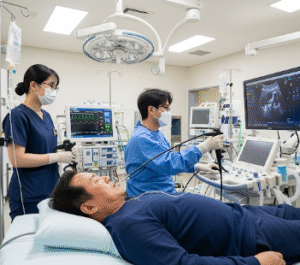Overview
Aspergillosis is a fungal infection caused by Aspergillus, a common mold found in the environment. While most people breathe in Aspergillus spores daily without any issue, it can cause serious illness in individuals with weakened immune systems, lung diseases, or prolonged corticosteroid use. The severity of aspergillosis can range from mild allergic reactions to life-threatening invasive infections.
What is Aspergillosis?
Aspergillosis refers to a group of diseases caused by Aspergillus species. The most common form is Aspergillus fumigatus. Depending on the individual’s health status, the infection may manifest in various ways:
- Allergic Bronchopulmonary Aspergillosis (ABPA) – An allergic reaction affecting people with asthma or cystic fibrosis.
- Aspergilloma – A fungal ball forming in a lung cavity.
- Chronic Pulmonary Aspergillosis (CPA) – Long-term infection causing cavities or nodules in the lungs.
- Invasive Aspergillosis – A rapidly spreading, life-threatening infection mostly affecting immunocompromised individuals.
Symptoms
Symptoms vary based on the form of aspergillosis:
Allergic Bronchopulmonary Aspergillosis (ABPA):
- Wheezing
- Coughing (sometimes with blood)
- Shortness of breath
- Fever
- Worsening asthma symptoms
Aspergilloma:
- Coughing (may include blood)
- Chest pain
- Fatigue
Chronic Pulmonary Aspergillosis:
- Weight loss
- Coughing with blood (hemoptysis)
- Breathlessness
- Fatigue
Invasive Aspergillosis:
- High fever
- Chest pain
- Shortness of breath
- Cough with blood
- Confusion (if it spreads to the brain)
- Severe illness, particularly in ICU patients or cancer patients
Causes
Aspergillosis is caused by inhaling spores of the Aspergillus mold, which is found in:
- Soil
- Decaying leaves or compost
- Dust
- Building materials (e.g., insulation)
- Air conditioning systems
Healthy people usually clear these spores without issues. However, those with compromised immunity or lung conditions are more susceptible.
Risk Factors
- Weakened immune system (due to cancer treatment, organ transplant, or HIV/AIDS)
- Chronic lung diseases (asthma, COPD, tuberculosis)
- Long-term corticosteroid use
- Cystic fibrosis
- Neutropenia (low white blood cells)
- ICU stays and ventilator use
- Previous lung cavities (from TB or sarcoidosis)
Complications
- Severe bleeding in the lungs from aspergilloma
- Respiratory failure in chronic or invasive aspergillosis
- Disseminated infection (spread to brain, heart, kidneys) in invasive forms
- Treatment resistance to antifungal drugs
- Death, especially in untreated invasive aspergillosis
Prevention
- Avoid exposure to areas with high mold concentration (e.g., construction sites, compost)
- Wear masks when working with soil or dust
- Maintain proper hygiene and indoor air filtration
- Use antifungal prophylaxis in high-risk patients (e.g., bone marrow transplant recipients)
- Manage underlying lung conditions and immune status proactively
- Avoid unnecessary use of immunosuppressive drugs
Treatment Options in Korea
South Korea provides advanced diagnostic tools, targeted antifungal therapies, and supportive care for all types of aspergillosis, especially in tertiary hospitals with infectious disease departments.
- Diagnosis
- Chest X-ray or CT scan: To detect fungal balls or lung damage
- Sputum culture or bronchoscopy: To identify the presence of Aspergillus
- Blood tests: Galactomannan assay or beta-D-glucan tests for invasive infections
- Allergy testing: For ABPA diagnosis
- Medication
- Antifungal drugs:
- Voriconazole (first-line treatment for invasive aspergillosis)
- Itraconazole (for ABPA and chronic aspergillosis)
- Amphotericin B or echinocandins for resistant cases
- Corticosteroids (ABPA): To reduce inflammation in the lungs
- Bronchodilators: For people with asthma or breathing difficulty
- Surgical Treatment
- Resection of aspergilloma: For severe bleeding or large fungal balls
- Embolization: To control hemoptysis in aspergilloma cases
- Chronic Disease Management
- Regular imaging and lab monitoring
- Lung rehabilitation and respiratory therapy
- Long-term antifungal therapy for CPA with monitoring for drug toxicity
- Infection Control in Hospitals
- Korean hospitals follow strict air filtration systems in ICUs and transplant units to prevent hospital-acquired Aspergillus infections
- Prophylactic antifungals are used in bone marrow and organ transplant patients













